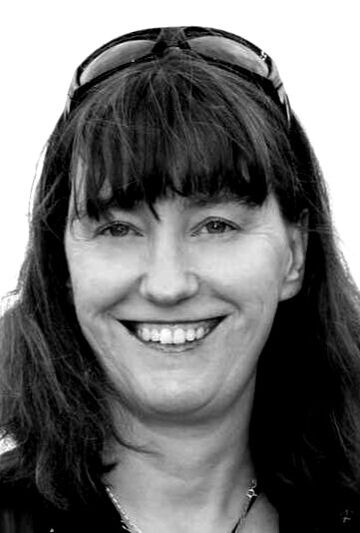
It gives me great pleasure to welcome Lindsay J. Sedgwick onto the website today. Lindsay is an author, award-winning screenwriter and the creator of Punky - the first mainstream animation series to feature a central character with Down's syndrome. In addition to her screenwriting and series of children's books, she has had 14 stage plays produced in Ireland and the UK, published two novels and a comprehensive guide to screenwriting, Write That Script!
Alex: Tell me a bit about yourself, Lindsay.
Lindsay: I grew up on Dublin’s northside, the youngest of eight kids born over 21 years. We lived in this wonderful big flat-roofed house – lots of leaks – opposite the sea and I can’t remember a time when I wasn’t writing. I just always loved words and can remember illustrating books of poems I’d written for my mother when I was seven and then writing my first novel at nine. In terms of interests as a child – the sea, being Evil Kenieval, starting secret societies, inventing a language, ghosts, writing stories and reading everything I could get my hands on!
My mother was a huge influence. She had been one of the first female scholars allowed into Trinity College, Dublin in the 30s and had an amazing love of language that she passed on to me. She was taking me to plays in our national theatre at the age of six.
She also steered me towards journalism, as the only way she could see of making a living from words – even though my father, an accountant, thought journalism akin to prostitution! I was writing for magazine letters pages for pocket money by the time I was in my teens and my first features were published at 18 in the Evening Herald. In the end, I was a freelance journalist for 13 years, writing stage plays on the side (several produced), books (unpublished) and the occasional screenplay (Fair City and Scratch Saturday, RTE (Ireland’s public broadcaster). I became a full time screenwriter in the 90s and had my first book published in 2017.
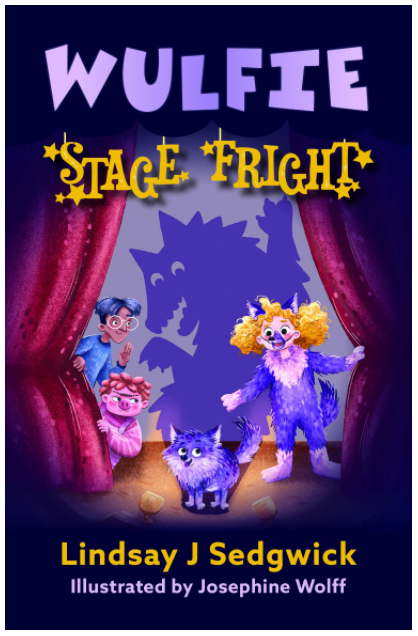
Alex: How would you describe your writing, and are there particular themes that you like to explore?
Lindsay: I’ve been told I write very visually, which is probably because of my background in screenwriting, and with a lot of humour and heart. I can always see the scenes in my head and the characters are often more real to me at the time of writing than my friends and family!
I love to explore life in all its complexity – what drives people is so interesting; what forms them, what’s under the surface and unsaid, or even unknown! In terms of theme, loss or fear of loss is under the surface of a lot of my books, and that comes from personal experience, but I do like things to work out happily, even if not exactly as the characters would expect, and with a hint that things may go awry again. My characters always grow within a story and it was really important to me with my first children’s series (Wulfie) that Libby who is the central character, has agency. Even though Wulfie has ‘magical’ powers, it is ultimately up to her to solve the problems she faces.
Across age groups, my central characters tend to not quite fit in for some reason; I like to explore how that feels and how tricky it can be to navigate. I think this comes from my childhood. In that sense, one of my goals is the acceptance and celebration of difference.
Alex: Are you a writer that plans a detailed synopsis or do you set out with a vague idea and let the story unfold as you write?
Lindsay: Both. Coming from screenwriting, I know the value of a strong outline but sometimes I have to fire everything down on a page to work out what the story is that I want to tell. It’s a longer process but it ensures that I don’t take the easy option and once I’m sure of the bones, I will outline the plot beat by beat.
As a comedy producer and writer once said to me, "If your brain isn’t hurting, you’re not working hard enough".
Lindsay: I’ve been told I write very visually, which is probably because of my background in screenwriting, and with a lot of humour and heart. I can always see the scenes in my head and the characters are often more real to me at the time of writing than my friends and family!
I love to explore life in all its complexity – what drives people is so interesting; what forms them, what’s under the surface and unsaid, or even unknown! In terms of theme, loss or fear of loss is under the surface of a lot of my books, and that comes from personal experience, but I do like things to work out happily, even if not exactly as the characters would expect, and with a hint that things may go awry again. My characters always grow within a story and it was really important to me with my first children’s series (Wulfie) that Libby who is the central character, has agency. Even though Wulfie has ‘magical’ powers, it is ultimately up to her to solve the problems she faces.
Across age groups, my central characters tend to not quite fit in for some reason; I like to explore how that feels and how tricky it can be to navigate. I think this comes from my childhood. In that sense, one of my goals is the acceptance and celebration of difference.
Alex: Are you a writer that plans a detailed synopsis or do you set out with a vague idea and let the story unfold as you write?
Lindsay: Both. Coming from screenwriting, I know the value of a strong outline but sometimes I have to fire everything down on a page to work out what the story is that I want to tell. It’s a longer process but it ensures that I don’t take the easy option and once I’m sure of the bones, I will outline the plot beat by beat.
As a comedy producer and writer once said to me, "If your brain isn’t hurting, you’re not working hard enough".
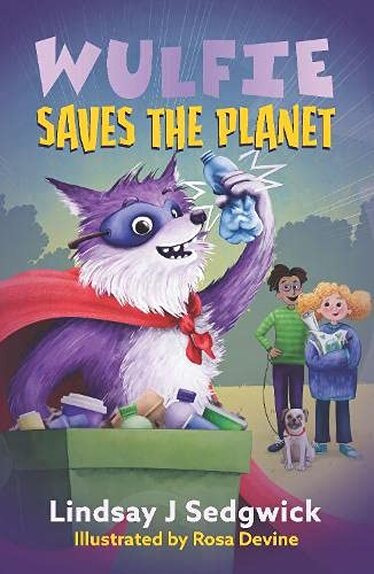
Alex: Tell us about your latest novel.
Lindsay: My latest book is the third in the Wulfie Series called Wulfie Saves The Planet. The series centre on the friendship between Libby, 10 and a purple wulfen she finds in her great great grandfather’s old mariner’s trunk. He’s the first purple wulfen born in hundreds of years and prefers play to war, making him a target of bullying in Lupuslandia. Like most wulfen’s, he can change shape, stop time with a sneeze and swallow bullies – even if Libby makes make him spit them out again. Wulfie is insatiably curious, mischievous and when he tries to help Libby with whatever problem she’s facing, he inevitably makes things worse. Each book is a standalone book but the fantastic thing about writing a series is that you can let the characters grow and change and readers are enjoying this and growing with them.
The first book Wulfie: Stage Fright involved a school play, the next one (Wulfie: Beast in Show) an evil dog breeder. In Wulfie Saves the Planet Libby faces a deadline for a school eco-project and if she doesn’t also do an award-winning second one for her step-brother Rex, he will tell his mum that Wulfie bit him and Wulfie will be history. So there’s a lot at stake and the stakes keep rising. Not least when Wulfie tries various means to help, including transforming himself into a cartoon eco super hero... and everyone gets more than they bargained for.
Lindsay: My latest book is the third in the Wulfie Series called Wulfie Saves The Planet. The series centre on the friendship between Libby, 10 and a purple wulfen she finds in her great great grandfather’s old mariner’s trunk. He’s the first purple wulfen born in hundreds of years and prefers play to war, making him a target of bullying in Lupuslandia. Like most wulfen’s, he can change shape, stop time with a sneeze and swallow bullies – even if Libby makes make him spit them out again. Wulfie is insatiably curious, mischievous and when he tries to help Libby with whatever problem she’s facing, he inevitably makes things worse. Each book is a standalone book but the fantastic thing about writing a series is that you can let the characters grow and change and readers are enjoying this and growing with them.
The first book Wulfie: Stage Fright involved a school play, the next one (Wulfie: Beast in Show) an evil dog breeder. In Wulfie Saves the Planet Libby faces a deadline for a school eco-project and if she doesn’t also do an award-winning second one for her step-brother Rex, he will tell his mum that Wulfie bit him and Wulfie will be history. So there’s a lot at stake and the stakes keep rising. Not least when Wulfie tries various means to help, including transforming himself into a cartoon eco super hero... and everyone gets more than they bargained for.
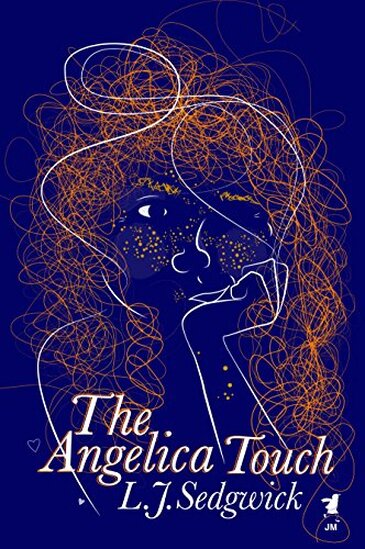
Alex: What was the first book you read?
Lindsay: I have a few books I loved as a child, starting with The Owl and the Pussycat by Edward Lear, illustrated magnificently by Dale Maxey, but I also loved the AA Milne books of poems including When We Were Very Young. The rhymes dance on your tongue. I remember reading Beatrix Potter and Enjd Blyton, especially The Faraway Tree and then diving into Susan Cooper’s The Dark is Rising.
Alex: How much research do you do and what does it usually entail?
Lindsay: It depends on the book but I will always seek out experts with personal experience of the issue I’m looking at, possibly because of my background as a journalist. I know that this is a way to discover a tiny detail I would not have thought of, or to check some aspect I want to include to find out if it’s valid.
For Punky, my cartoon series in which the central character has Down’s syndrome, I hung out with mums and their kids as well as talking to various associations, experts and activists in the field. I also had friends with a brother and a niece who had Down’s and I was inspired by the relationship between my step children, one of whom (Darragh) is autistic and the dynamics of this family that my daughter and I had joined.
Wulfie Saves the Planet has a superhero and environmental theme so I asked the children in the readership age various questions - what superhero skill they’d like, if they could have any; what superheroes they admired and why; if as a superhero they could do anything to help with climate change etc. I also read lots of comics to make sure I got the language right!
Alex: Do you ever base your characters on people you have encountered in real life?
Lindsay: There are bits of lots of people in them, but none are specific to any one person. Emotionally, however, I’m sure many of the characters hold parts of myself and parts of people I know. And certain situations come from real life – and wish-fulfilment!
Lindsay: I have a few books I loved as a child, starting with The Owl and the Pussycat by Edward Lear, illustrated magnificently by Dale Maxey, but I also loved the AA Milne books of poems including When We Were Very Young. The rhymes dance on your tongue. I remember reading Beatrix Potter and Enjd Blyton, especially The Faraway Tree and then diving into Susan Cooper’s The Dark is Rising.
Alex: How much research do you do and what does it usually entail?
Lindsay: It depends on the book but I will always seek out experts with personal experience of the issue I’m looking at, possibly because of my background as a journalist. I know that this is a way to discover a tiny detail I would not have thought of, or to check some aspect I want to include to find out if it’s valid.
For Punky, my cartoon series in which the central character has Down’s syndrome, I hung out with mums and their kids as well as talking to various associations, experts and activists in the field. I also had friends with a brother and a niece who had Down’s and I was inspired by the relationship between my step children, one of whom (Darragh) is autistic and the dynamics of this family that my daughter and I had joined.
Wulfie Saves the Planet has a superhero and environmental theme so I asked the children in the readership age various questions - what superhero skill they’d like, if they could have any; what superheroes they admired and why; if as a superhero they could do anything to help with climate change etc. I also read lots of comics to make sure I got the language right!
Alex: Do you ever base your characters on people you have encountered in real life?
Lindsay: There are bits of lots of people in them, but none are specific to any one person. Emotionally, however, I’m sure many of the characters hold parts of myself and parts of people I know. And certain situations come from real life – and wish-fulfilment!
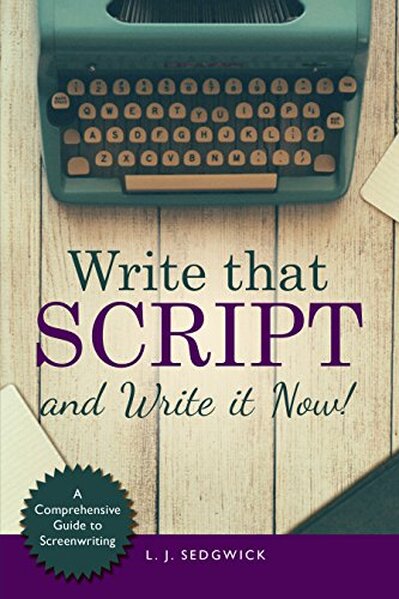
Alex: Which was the last book you read that blew you away?
Lindsay: Too Many Men by Lily Brett. It’s an amazing novel, full of tragedy and comedy, about a woman who takes her father, who survived the holocaust, back to Poland because she needs him to help her make sense of the past. In terms of children’s books, I just read The Edge of The North by Sinead O’Hart and couldn’t put it down!
Alex: How do you market your books?
Lindsay: Through social media – Instagram, Twitter , my website, LinkedIn and Facebook. I do interviews and articles for book and writing blogs, radio interviews , newspaper articles in local papers, blog or twitter ‘takeovers’. For my screenwriting book, I run courses and workshops on this dark art; for the Wulfie series, I do workshops on writing series, developing character etc (for writers from 11+) or hands-on creative workshops with younger kids. The Wulfie series is published by the award-winning publisher Little Island Books so they will also do marketing through their own channels.
Alex: What are your interests aside from writing? And what do you do to unwind?
Lindsay: I doodle and paint, garden a bit – in a messy sort of way – and go for walks with friends. Pre Covid, I loved going to the theatre and to films regularly but I haven’t got back into that yet. And I also brainstorm odd notions to see if they will lead to something.
Alex: Which authors do you particularly admire and why?
Lindsay: Elizabeth Strout, I love every line of her books. It seems effortless but the crafting is impeccable. Also Barbara Kingsolver; I admire how she holds all the balls in the air, develops stories that are long and move through time but without losing the reader. Colette is another, I devoured her books as a teenager, but Salman Rushdie’s Midnight’s Children also blew me away and I love Gabriel Garcia Marquez.
Alex: Thank you so much, Lindsay for sharing your writing journey with us. It's been fascinating to listen to you, and I love the fact that your main character in Punky has Down's syndrome. There are so few narratives out there that feature characters with special needs and disabilities. It's why I wrote The Chair Man, whose protagonist is a tetraplegic.
Lindsay: It's been a real pleasure, Alex. Thanks for having me.
Lindsay: Too Many Men by Lily Brett. It’s an amazing novel, full of tragedy and comedy, about a woman who takes her father, who survived the holocaust, back to Poland because she needs him to help her make sense of the past. In terms of children’s books, I just read The Edge of The North by Sinead O’Hart and couldn’t put it down!
Alex: How do you market your books?
Lindsay: Through social media – Instagram, Twitter , my website, LinkedIn and Facebook. I do interviews and articles for book and writing blogs, radio interviews , newspaper articles in local papers, blog or twitter ‘takeovers’. For my screenwriting book, I run courses and workshops on this dark art; for the Wulfie series, I do workshops on writing series, developing character etc (for writers from 11+) or hands-on creative workshops with younger kids. The Wulfie series is published by the award-winning publisher Little Island Books so they will also do marketing through their own channels.
Alex: What are your interests aside from writing? And what do you do to unwind?
Lindsay: I doodle and paint, garden a bit – in a messy sort of way – and go for walks with friends. Pre Covid, I loved going to the theatre and to films regularly but I haven’t got back into that yet. And I also brainstorm odd notions to see if they will lead to something.
Alex: Which authors do you particularly admire and why?
Lindsay: Elizabeth Strout, I love every line of her books. It seems effortless but the crafting is impeccable. Also Barbara Kingsolver; I admire how she holds all the balls in the air, develops stories that are long and move through time but without losing the reader. Colette is another, I devoured her books as a teenager, but Salman Rushdie’s Midnight’s Children also blew me away and I love Gabriel Garcia Marquez.
Alex: Thank you so much, Lindsay for sharing your writing journey with us. It's been fascinating to listen to you, and I love the fact that your main character in Punky has Down's syndrome. There are so few narratives out there that feature characters with special needs and disabilities. It's why I wrote The Chair Man, whose protagonist is a tetraplegic.
Lindsay: It's been a real pleasure, Alex. Thanks for having me.
